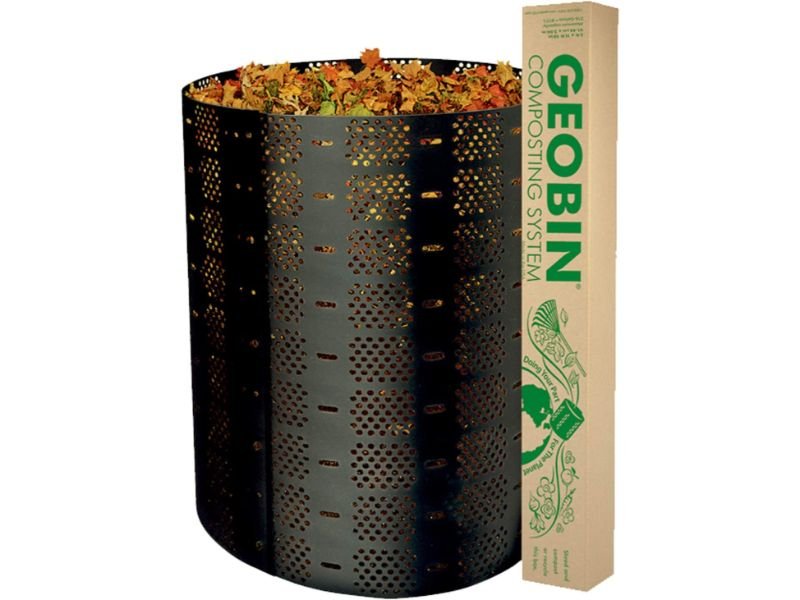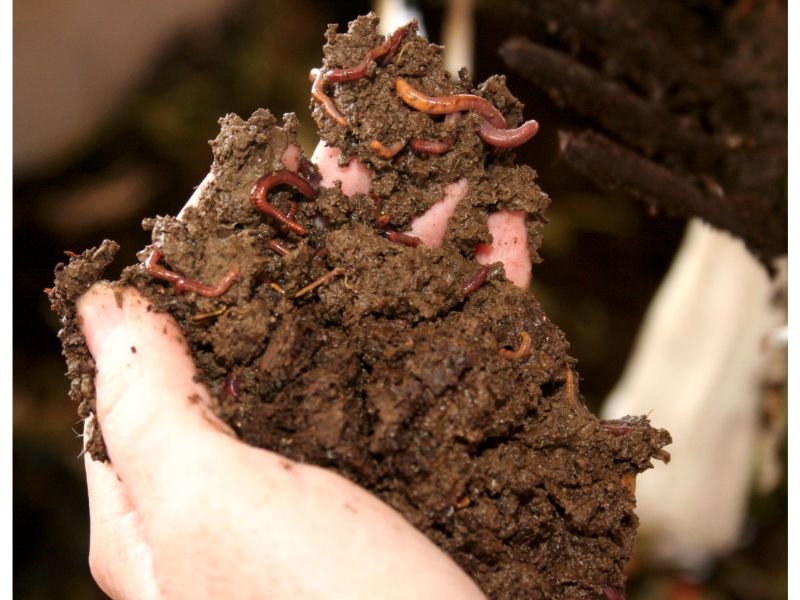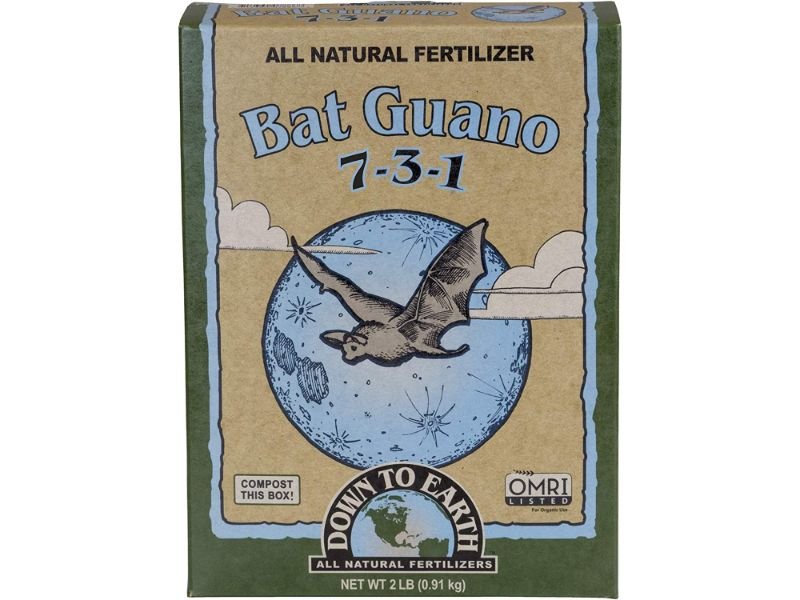The secrets to bountiful harvests and vibrant plant life lie beneath the powers of organic fertilizers. But beware, as a misstep in organic fertilizing can unleash chaos upon precious plants–from wilting leaves to stunted growth. In this specially made section, we’ll let you become the master of organic fertilizers, starting from understanding the organic manure examples to ensuring the best way to give your plant companions the extra nutrients they deserve.

Table of Contents
Types of Organic Fertilizers
Compost
Availability: 9/10
Affordability: 9/10
The most well-known organic manure examples are compost, often hailed and marketed as the “black gold”. This nutrient-rich organic matter is created through the natural process of decomposition of kitchen scraps, leaves, yard waste, and grass clippings. As a powerful organic fertilizer, compost is rich in nitrogen, phosphorus, potassium, and a wide array of trace elements, and is also highly recommended due to its ability to improve soil structure.
This nutrient-rich organic matter is the embodiment of fertility, a tantalizing feast for your plants that will awaken their senses and invigorate their growth. Imagine your plants basking in the abundance of nitrogen, phosphorus, and potassium, the essential nutrients they crave, all wrapped up in this alluring black substance. But that’s not all—compost is a magician, hiding within its depths a myriad of trace elements, enchanting your soil and nurturing it back to life.
But did you know that you can make your own compost at home? And the best part is, the materials to make compost are abundant right in your kitchen. Here’s how you can effortlessly turn your kitchen scraps into nutrient-rich compost for your garden:
- Start by collecting kitchen scraps such as fruit and vegetable peels, coffee grounds, tea bags, and eggshells. These everyday items are the building blocks of your compost.
- Find a suitable compost bin or container for your kitchen. It can be as simple as a dedicated bucket or a specialized composting system. Make sure it has proper ventilation and drainage to facilitate the decomposition process.
- Layer your kitchen scraps with other compostable materials like yard waste, leaves, and small twigs. This helps create a balanced compost mix and prevents the pile from becoming too wet or compacted.
- Give your compost pile some love by turning it regularly with a garden fork or shovel. This aerates the mixture and speeds up decomposition.
- Be patient as nature works its magic. Over time, your kitchen waste will transform into dark, crumbly compost—nature’s gift to your plants.
By making your own compost at home, you not only reduce food waste but also nourish your garden with a sustainable and cost-effective fertilizer. Get creative, involve the whole family, and watch as your kitchen scraps turn into a valuable resource. Start your composting journey today and unlock the benefits of homemade compost for a greener, more vibrant garden!
Our favorite compost bin:

Animal Manure
Availability: 8.5/10
Affordability: 8/10
As the name states, animal manure is a type of organic fertilizer made from cows, horses, poultry, and pigs’ feces and urine. This organic fertilizer is highly regarded due to a balanced combination of the basic N-P-K along with additional nutrients such as zinc, copper, and manganese. Animal manure is also eco-friendly, as by using this type of organic fertilizer, you’re contributing to recycling and repurposing animal waste!

Blood Meal
Availability: 8/10
Affordability: 7.5/10
Yes, you’re right, the main ingredients to make these organic manure examples are dried animals’ blood, which is usually derived from slaughterhouses. Unlike compost and animal manure, the highest content of blood meal is nitrogen, which plays a crucial role in promoting lush foliage, green coloration, and overall vegetative development. This makes blood meal the more suitable choice for nitrogen-loving plants like kale and spinach.
Bone Meal
Availability: 8.5/10
Affordability: 8.5/10
Bone meals are another organic manure examples that are made from finely grounded animal bones, generally cattle or fish. In contrast to blood meals, bone meals are valued for their high phosphorus content. Phosphorus is the key nutrient for plants’ root development, flowering, and producing fruits. However, it’s wise to not fertilize acid-loving plants, wildflowers, ferns, and carnivorous plants with this type of organic fertilizer, as they prefer lower phosphorus content.
Seaweed and Kelp
Availability: 7.5/10
Affordability: 7.5/10
This type of organic fertilizer is derived from algae that live in marine environments. They’re an example of liquid organic fertilizer that is highly regarded due to exceptional nutrients including N-P-K, calcium, magnesium, and growth-promoting hormones like auxins and cytokinins. However, in terms of price, seaweed, and kelp organic fertilizers can cost you more money to spend, depending on the brand, form (liquid, powder, or granule), and concentration.

Fish Emulsion
Availability: 8/10
Affordability: 7.5/10
Fish are not just beneficial for food and as your marine companion, they can also be made as favorable organic fertilizer for your beloved plants! Fish emulsion is a type of organic fertilizer that is obtained from fish waste, including fish carcasses, fish bones, and fish heads. Aside from containing a balanced combination of macro and micronutrients, fish emulsion is also typically in a readily-available form for plants, allowing for a quick boost to plants that have been showing signs of nutrient deficiency.

Worm Castings
Availability: 8/5/10
Affordability: 9/10
Also known as vermicast, worm castings are part of organic fertilizers produced by earthworms. They are prized for their rich assortment of nutrients, beneficial microorganisms, enzymes, and humic acid (HA) substances–which may not be found in every organic fertilizer. The sticky mucus secreted by earthworms during digestion helps to bind the soil particles, enhancing soil porosity, and water-holding capacity. Meanwhile, the microorganisms that are present in vermicast help suppress harmful pathogens and pests.

Guano
Availability: 7.5/10
Affordability: 7.5/10
We can say that guano is a premium organic manure example of animal secretion compost. If animal manure is mainly collected from farm animals, the main ingredient of guano is the excrement of seabirds and bats. Guano, although not as popular as the previous organic fertilizers, is recommended for various good reasons. First, it’s derived from natural ingredients with low to no use of synthetic additives. Additionally, guano can be a sustainable organic fertilizer alternative that improves soil structure and microbial activity.

If you want to learn more about organic fertilizers and delve into the fascinating world of sustainable gardening practices, look no further than the enlightening book, “Garden Alchemy: 80 Recipes and Concoctions for Organic Fertilizers, Plant Elixirs, Potting Mixes, Pest Deterrents, and More.” This invaluable resource offers a comprehensive guide to creating your own organic solutions, empowering you to nurture your plants naturally while minimizing your environmental impact. With its wealth of knowledge and practical advice, “Garden Alchemy” is a must-read for anyone seeking to cultivate a thriving garden in harmony with nature.

What Is the Importance of Organic Manure?
As someone with a green thumb, we do understand that the primary use of these organic manure examples is to provide our plants with additional nutrients. But the importance of organic manure goes beyond providing nutrients to plants. One key aspect is to improve the soil’s health too by increasing its organic matter content. Organic manure also helps to suppress soil-borne diseases and pests, such as root rot, Rhizoctonia, and Fusarium. Moreover, organic manure is contributing to sustainable agriculture, since they’re sourced from renewable waste.
What Is the Importance of Potassium in Plants?
Just like how we need a balanced diet to stay healthy, our precious plants also need potassium to thrive, which can be found in those organic manure examples. This incredible nutrient plays a vital role in your plants’ life. First, potassium helps regulate water movement and aids photosynthesis, helping plants convert sunlight into energy. Potassium also strengthens your plants’ immune system by making them more resistant to pests, diseases, and stressful growing environments!
The Importance of Organic Fertilizer For Soil Fertility
The main advantage of organic fertilizer that you can’t likely get from synthetic fertilizer is its ability to promote beneficial microbial activity. These microscopic heroes break down the organic materials and then release them slowly and steadily, thus improving the soil’s fertility and structure. To add, organic manure examples like blood meal and vermicast works like Wonder by providing a wide range of essential nutrients for healthy growth that can be easily absorbed by the soil and the roots.
What Are The Signs Of Nutrient Deficiency in Plants?
When it comes to organic fertilizing, it’s predominant to strike a balance. Just like we need a healthy snack but not an entire buffet, applying too much organic fertilizers can lead to nutritional imbalances, environmental pollution, and even harm the plants which could result in death. On the other side, you should also keep an eye for signs of nutrient deficiency, including but not limited to yellow leaves, no or abnormal slow growth, wilting leaves, and reverting or dull color. Following the recommended dosage provided by the manufacturer is also equally important.
Organic vs Synthetic Fertilizers: Which One Is Better?
This is a never-ending debate, as there is no exact answer to “one-fits-all”. The previous organic manure examples, as the name implies, are all derived from natural sources, known to enhance microbial activity, and long-term soil health and fertility. Meanwhile, synthetic fertilizers provide readily available nutrients, more precise nutrient ratios, and can provide quick results. The choice between organic or synthetic fertilizers, nonetheless, depends on your gardening goals and the specific needs of your plants.
Organic Fertilizers in Brief
From compost, which you can make by yourself, to the “premium” guano and the high phosphorus content bone meal, there are numerous organic manure examples that you can try and mix based on your plant’s needs. While providing the basic N-P-K and the other macro and micronutrients, organic fertilizers are also known for their eco-friendliness and sustainable gardening practices.

New author in the hood. Loves gardening and flowers are my spirit animals (yes I know they are not animals but I insist). I will be covering most of the flowers’ topics here and occasionally random though as well.






